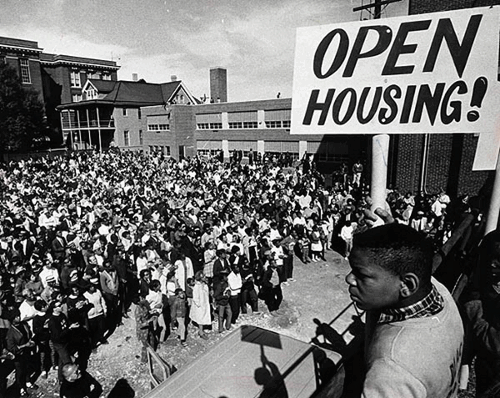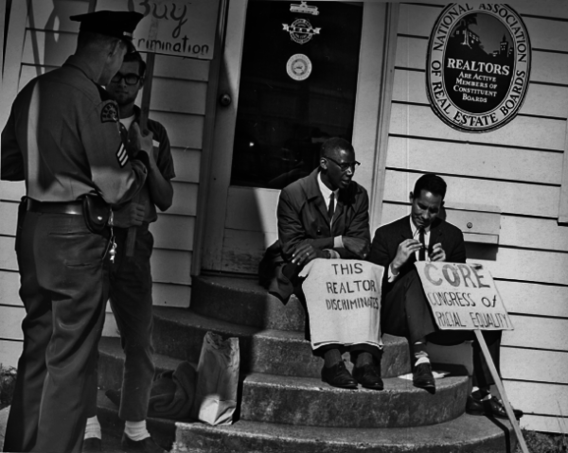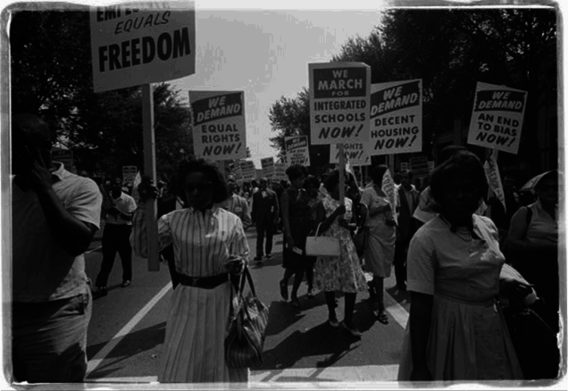Excerpt 1
"To start off the hearings we called a remarkable witness, Carlos Campbell, a young African-American navy lieutenant.... After a series of impressive assignments in the navy, he had earned a posting to the Pentagon, but, try though they might, he and his wife couldn't find an apartment anywhere nearby. He told of going to various homes and apartment houses with For Rent signs. Many of the landlords, he said, had been encouraging over the telephone. But when they saw him in person, they would go into excuse-land. He kept right at it. His wife would go with him. The Defense Department had a housing office that tried to help him, and even they couldn't find anything in white neighborhoods. They knew what the problem was. Some of them even encouraged him to look in black neighborhoods. It was a disgrace. Here was a person good enough to perform tough assignments for our country in the armed forces, but not good enough to find housing for himself and his family."
Walter Mondale, The Good Fight (New York: Scribner) at 59.
Excerpt 2

"In the last few weeks, there has been talk of causes, cures, and civil rights. The proposed remedies are many. Their efficacy is uncertain. The truth is, it seems to me, that there is no one solution, but there are many solutions. Our cities are beset by a multitude of ills, which can be cured only by a multitude of remedies. But every solution and every plan for the multiple evils in our cities and their ghettos is drastically and seriously affected by racial segregation in housing. With high concentrations of low-income, poorly educated, and unemployed persons in our cities—and without dispersal or balance throughout our communities—our cities will never be able to solve the problems of de facto school segregation, slum housing, crime and violence, disease, blight, and pollution." 90th Cong., 1st sess., Congressional Record 113 (August 16, 1967) at 22841.
"This legislation alone will not bring an end to the ghetto—but it will provide the opportunity for those persons economically able to escape the ghetto to do so, and to take their families with them. It will assure them free choice in the selection of their housing. For those still condemned by poverty to remain in the ghetto, there will be at least the knowledge that it is poverty—and not their fellow citizens or their Government—that forces them to live in the slums. There will be at least the knowledge that their children will have an opportunity to escape the restrictions and confines of the ghetto pressure cooker." 90th Cong., 1st sess., Congressional Record 113 (August 16, 1967) at 22842.
Excerpt 3
"I think that there is a crucial debate under way in American ghettos, and that debate involves a dispute about the basic decency of white America. . . . This proposal which we call 'fair housing' is fundamental to that debate. Because the resolution of that issue I think depends more upon white America than upon the persuasiveness of these two opposite points of view. Because we have to show that we intend to be decent Americans. We must show that we don't intend to live separately in this country but that we intend to live together." U.S. Congress. Senate. Committee on Banking and Currency. Fair Housing Act of 1967: Hearings Before the Subcommittee on Housing and Urban Affairs. 90th Cong., 1st sess., August 21, 22, and 23, 1967 at 2.
Excerpt 4
"There is no doubt that national fair housing legislation is a controversial issue, but the grave urgency of the urban crisis requires immediate congressional action. The barriers of housing discrimination stifle hope and achievement, and promote rage and despair; they tell the Negro citizen trapped in an urban slum there is no escape, that even were he able to get a decent education and a good job, he would still not have the freedom other Americans enjoy to choose where he and his family will live. Outlawing discrimination in the sale or rental of housing will not free those trapped in ghetto squalor, but it is an absolutely essential first step which must be taken—and taken soon." 90th Cong., 2nd sess., Congressional Record 114 (February 6, 1968) at 2274.
Excerpt 5

"The image of the tumbledown slatboard shack in the rural South has been replaced by what is to my mind an even more regrettable, more terrible alternative—the filthy, freezing urban slum tenement. Added to the monumental problem of poverty in the cities is the totally related problem of segregated housing. These two monstrous national disgraces are really only one." 90th Cong., 2nd sess., Congressional Record 114 (February 14, 1968) at 2992.
Excerpt 6

"De facto segregation in schools and education is directly traceable to the existing patterns of racially segregated housing. We cannot afford to allow our efforts to provide the best education possible to all Americans to be thwarted by actions of private persons, actions which are antisocial, immoral, and which ultimately amount to contravention of our public policy in favor of equal educational opportunity. Fair housing is therefore more than merely housing. It is part of an educational bill of rights for all citizens." 90th Cong., 2nd sess., Congressional Record 114 (February 15, 1968) at 3134.
Excerpt 7
"On Monday we face the fourth cloture vote on fair housing. A majority of the Senate is on record in favor of what the Riot Commission recommends—a law covering the sale or rental of all housing. We have compromised this stand in order that the Senate not remain paralyzed behind the cloture requirement. Monday's vote may be the final attempt—the choice remains with less than a majority of the Senate. Their choice is whether to send America further along the road of polarization and the ultimate destruction of a democracy based upon equality—or to indicate to Americans and to the world—that we are not a racist society. A vote for cloture on Monday will reinforce our determination to end the unconscionable insult of racial discrimination in housing." 90th Cong., 2nd sess., Congressional Record 114 (March 2, 1968) at 4898.